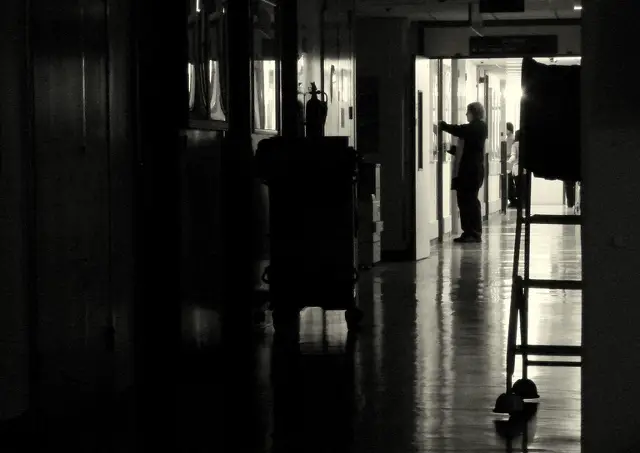Andy shares this latest news from Isle of Wight NHS Trust. Ed
Health care services provided by Isle of Wight NHS Trust are under significant pressure as plans are put in place for the forthcoming IW Festival weekend.
Last week (29th May to 4th June) 1,533 people called the Island’s NHS 111 service for advice and direction towards which health service they should use; 842 people attended the Emergency Department and 364 people attended the Urgent Care Service at St. Mary’s and there were 221 emergency admissions.
Significant pressure
As part of the Trust’s plans for the forthcoming IW Festival, patients who are currently in St. Mary’s Hospital are being reviewed for their fitness for care at home, with appropriate support or discharge to a nursing or residential care home.
Shaun Stacey, Chief Operating Office at Isle of Wight NHS Trust said:
“The pressures in our healthcare system at the moment are significant. We had a very busy week last week and need to create the ‘headroom’ this week to ensure that we can manage the forthcoming IW Festival weekend. We’re planning for the usual influx of festival goers as well as ensuring that we have good plans in place to support our island people and any unexpected or untoward events. At St. Mary’s this means that we are reviewing all patients. Patients who can be mobilised, dressed and sit out of their beds during the day are being encouraged to do so. No one wants to be in hospital and getting patients mobilised and into a normal routine helps them towards discharge more quickly and a better longer term recovery.”
Call 111 first
At a time when St. Mary’s Hospital is under significant pressure patients with minor illnesses are still attending the Urgent Care Service (UCS) for advice and treatment without following the advice on treatment of minor illness or phoning 111 first.
There are a full range of services available on the Island to help treat minor illnesses and conditions, such as Pharmacies and NHS111, but doctors and nurses at the hospital are still seeing people coming to the Urgent Care Service with minor illnesses and conditions which could be treated without a long wait or the need to travel into Newport.
Shaun continued:
“I would encourage individuals to call 111 before walking into the Urgent Care Service at St. Mary’s Hospital. The former Beacon Health Centre has been redesigned as a service for patients with an urgent care need but it’s essential to phone first. Over recent days individuals have attended the service with conditions which could have been effectively treated elsewhere with a shorter waiting time.”
Not requiring Urgent Care
These conditions inappropriately attending the Urgent Care Service include:
Diarrhoea and vomiting (D&V)
It is vital that anyone who is feeling unwell with vomiting and/or diarrhea stays at home for at least 48 hours after the symptoms stop to avoid the spread of infection. Keeping hydrated and drinking plenty of fluids is very important, particularly for the elderly and the very young that are most at risk. If the symptoms persist, telephone NHS 111. Good hygiene is important during outbreaks of diarrhoea and vomiting as it is highly contagious. To prevent becoming infected it is very important to wash your hands with soap and water after you have been around someone who is ill. Thorough cleaning of hard surfaces with a bleach solution, paying particular attention to the toilet and toilet area will help to reduce the spread of the virus.
Advice: Diarrhoea and vomiting
Back pain
Back pain is a common problem that affects most people at some point in their life. It may be triggered by bad posture while sitting or standing, bending awkwardly, or lifting incorrectly. It’s not generally caused by a serious condition. In most cases back pain will improve in a few weeks or months, although some people experience long-term pain or pain that keeps coming back.
Advice: Back pain
Stress
Stress is the feeling of being under too much mental or emotional pressure. Pressure turns into stress when you feel unable to cope. People have different ways of reacting to stress, so a situation that feels stressful to one person may be motivating to someone else. Many of life’s demands can cause stress, particularly work, relationships and money problems. And, when you feel stressed, it can get in the way of sorting out these demands, or can even affect everything you do.
Advice: Stress
Colds
A cold is a mild viral infection of the nose, throat, sinuses and upper airways. It’s very common and usually clears up on its own within a week or two.
Advice: Colds
Ear ache
Earache is a common problem, particularly in children. It can be worrying, but it’s usually only caused by a minor infection and will often get better in a few days without treatment. It’s not always necessary to see your GP if you or your child have earache. The pain will often improve in a few days and there are things you can do to help in the meantime.
Advice: Ear ache
Coughs
There’s usually no need to see your GP if you or your child have a mild cough for a week or two.
Advice: Cough
Mark Pugh, Executive Medical Director at Isle of Wight NHS Trust, said:
“Whilst we fully appreciate that when a person is unwell, they want advice on how they can get better, the Urgent Care Service at St. Mary’s is not the right place for most minor conditions which we still see coming through our doors. The volume of people attending with non urgent needs has an impact on our ability to attend to the very sick and those who need urgent attention.
“People are having a long wait because we have to prioritise more urgent cases to be seen for things which could be self-treated or much better managed by a Pharmacist or GP in the community and often much quicker, especially if people make use of the NHS111 service or online advice services such as NHS Choices or What0-18 (www.what0-18.nhs.uk). We would encourage people to take more responsibility for managing their health problems that do not need to be treated at St. Mary’s Hospital, but could be managed at home or elsewhere.”





